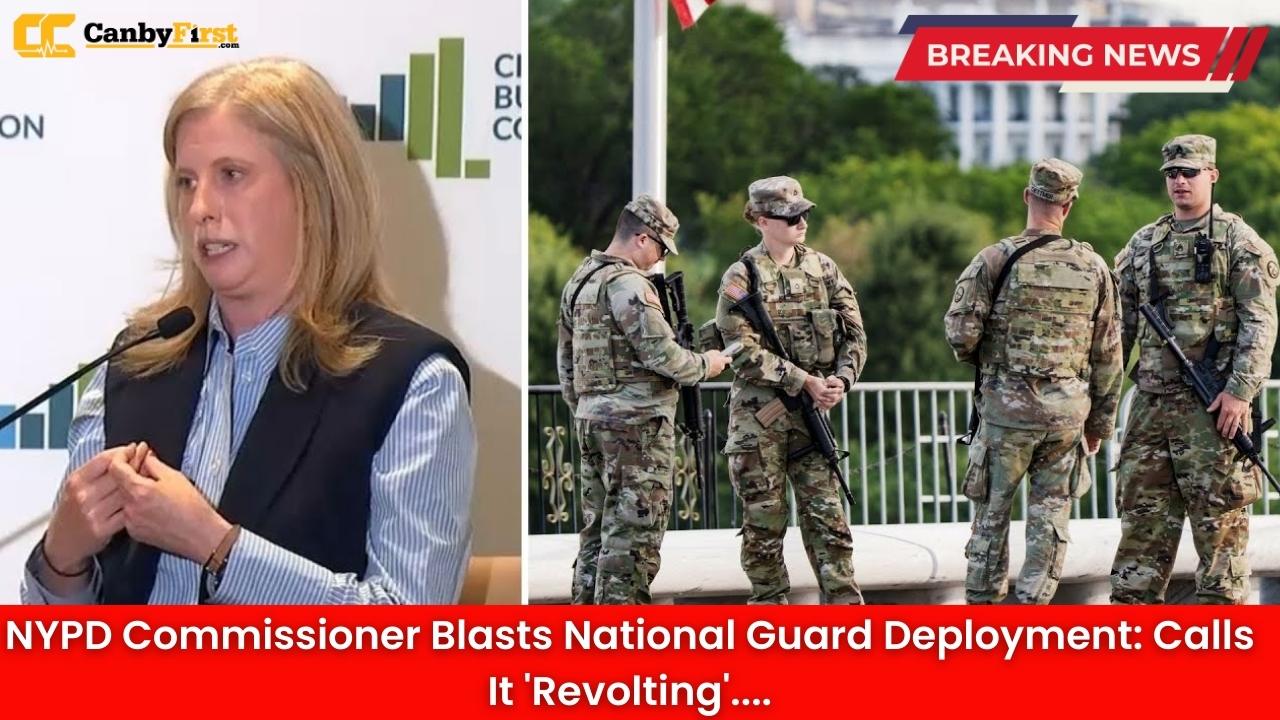New York, US: In a strongly worded statement that is stirring national debate, New York Police Department Commissioner Edward Caban Tisch said she is “revolted” by the growing presence of National Guard troops patrolling the streets of America’s biggest cities, including New York. Her remarks come amid rising tension over the balance between public safety and military involvement in civilian life.
Commissioner Tisch’s Strong Opposition
Commissioner Tisch did not mince words when addressing the issue during a press briefing on Wednesday. She emphasized that the visible deployment of uniformed National Guard members in urban centers signals, in her view, a troubling overstep into civilian policing matters.
“The streets of New York belong to the people of New York, to be protected and served by the NYPD, not by the military,” Tisch said. “The idea of soldiers patrolling our sidewalks is revolting—plain and simple. It goes against the spirit of community policing and undermines decades of trust we’ve worked to build with our neighborhoods.”
Also Read
Her statement echoed growing concern among police leaders and civil liberties advocates who argue that bringing in National Guard forces can erode public confidence and create a climate of fear, rather than safety.
Why the Guard Is Here
The National Guard presence in major cities has often been justified by rising crime rates, high-profile incidents of unrest, and political pressure to show toughness on public safety. Recent weeks have seen Governors deploying Guard troops to supplement strained city police departments struggling with spikes in street violence, homelessness, and protest activity.
Critics argue that the decision overlooks the expertise and role of trained local law enforcement. While the Guard may provide visible deterrence, it lacks the community-based approach that urban policing requires. “Policing is not combat,” Tisch said. “It is relationship-driven, community-driven. Soldiers are not trained to address mental health crises or respond with the measured discretion that our officers do every day.”
Political Fallout Growing
Commissioner Tisch’s remarks could place her in direct conflict with both state and federal officials who have defended the deployments as necessary emergency measures. Some leaders argue that overstretched police forces in cities like New York, Chicago, and Philadelphia need the added manpower to restore order.
However, Tisch’s opposition illustrates a deeper divide over how to handle urban challenges. The NYPD, already one of the largest and most well-resourced police forces in the world, sees the measure as both symbolic and unnecessary. Her blunt rejection represents not just a local pushback but potentially a national turning point in the debate over military roles in domestic policing.
Residents React With Mixed Views
On the streets of New York, reactions to the National Guard’s presence are divided. Some residents say the troops make them feel safer in light of rising reports of violence in certain neighborhoods. Others, however, view the soldiers’ patrols as unsettling and excessive.
“I don’t want to walk past men with rifles when I go to the grocery store,” said a Brooklyn resident. “This isn’t a warzone, it’s my neighborhood.”
Meanwhile, some community groups have pointed out that deploying military forces can disproportionately affect marginalized neighborhoods, where trust in law enforcement is already fragile.
History Repeating Itself
The controversy recalls past moments when military forces were sent into cities—such as during civil unrest in the 1960s or more recently during large-scale protests. Each time, the moves fueled debate about government overreach and constitutional concerns.
Law enforcement experts warn that such measures, if normalized, risk changing the fabric of urban policing. “Once soldiers become a common sight on the sidewalks, we normalize militarization of daily life,” one analyst noted.
What Comes Next
Commissioner Tisch signaled that she intends to raise her concerns with state officials and press for the National Guard to step back from routine street patrols. “We should never confuse law enforcement with military action,” she said. “We owe it to New Yorkers to keep policing civilian-led, accountable, and grounded in community values.”
Whether her stance will influence policy remains to be seen, but her sharp words are already sparking renewed public conversation—and political controversy—over how America ensures safety without crossing the line into military occupation of its own streets.
FAQ
Why are National Guard troops in New York City?
They have been deployed as a response to violent crime spikes, protest-related unrest, and political calls for more visible security in certain areas.
What is Commissioner Tisch’s main objection?
She argues that visible military presence undermines community policing, erodes public trust in civilian law enforcement, and sends a disturbing message about the militarization of public life.
Do some residents support the deployment?
Yes, some feel calmer seeing troops in their neighborhoods, but others are uneasy about soldiers patrolling civilian streets.
Is this a new situation?
No. The use of National Guard troops in cities has occurred during past crises, such as civil rights protests, anti-war demonstrations, and riots, but it has always sparked controversy.
Could these deployments continue?
That decision depends on state and federal leadership, as well as local law enforcement reception. Tisch’s opposition could add pressure to reconsider long-term use of troops on city streets.












